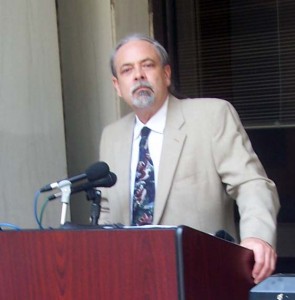Sascha Meinrath, Director of New America Foundation’s Open Technology Initiative, speaks at a press conference before the hearing.
A three-hour meeting of a legislative subcommittee Aug. 5 gave opponents of privatizing SC ETV’s broadband spectrum their first opportunity to challenge the contract that privatizes the system. The SC Progressive Network presented testimony that the state should retain control of 25% of the spectrum for public use. This “mid band” portion of the spectrum would allow robust wireless Internet statewide.
The contract now under consideration could result in the public losing control of the nation’s only unified, statewide broadband system.
The subcommittee decided that further study of the contract terms were necessary.
The proposed contact leases the statewide educational broadband system to Clearwire and Digital Bridge for 30 years.
Sen. Harvey Peeler and Rep. Gilda Cobb-Hunter, who represent rural counties, were concerned that the contract doesn’t require the companies to provide service in rural and under-served areas.
Sascha Meinrath, Director of New America Foundation’s Open Technology Initiative, testified and responded to questions regarding the practicality of adopting the system for public access. Meinrath’s participation provided the Network with the necessary technical side of issue. Meinrath’s comments on the historical under-valuation of public airwaves was of particular interest to the subcommittee.
Sen. Glen McConnell, chair of the subcommittee, gave all interested parties until Aug. 14 to submit additional information on:
* The value of public retention of 25% of the spectrum. What will it cost to set up and maintain public access WiMax systems and how will it be paid for (by off setting cost of public entities leasing service, etc.). We have to show that giving up $35 million in lease revenue over the 30 years of the lease is a good deal for the state and taxpayers. Can we show that the value of the licensed spectrum will increase?
* The contract calls for the vendors to provide three free, regular subscription broadband services in each area of the 67 licenses. Are there places where Clearwire, or other vendors, provided more free incentives for lucrative contracts?
* The companies are being asked to provide examples of how they provide service to rural areas to address the problem that the contract allows service to be “market driven.”
SC Progressive Network Director Brett Bursey addresses the media at a press conference before the subcommittee hearing.
Letters that support public control of 25% of the state’s educational broadband system should include specific cost savings and applications. Address your letters to: Sen. Glenn McConnell, Chairman, Joint Bond Review Subcommittee on the EBS. Send your comments to the Progressive Network at network@scpronet.com or PO Box 8325, Columbia SC 29202.

